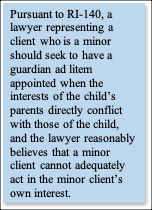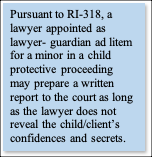Conflicts in Child Protection Proceedings [Michigan]: Part 1 ~ To whom does an L-GAL Owe Fidelity
- RL Johnson
- May 5, 2022
- 7 min read

by Christian, civil trial attorney, RL Johnson
To defend the cause of the weak and fatherless and maintain the rights of the poor and oppressed is the highest calling of the Christian lawyer. Toward this end. I am publishing this series of pieces for lawyers who dedicate a portion of their practice to the service of children.
‘Truly I tell you, whatever you did for one of the least of these brothers and sisters of mine, you did for me.’
~ Matthew 25:40
To whom does an L-GAL owe fidelity? That is, is an L-GAL’s duty to the child, the child’s best interest, or to the court? E.g., a lawyer is unclear as to which statute(s), court rule(s), case law, and rules of professional conduct govern the lawyer’s obligations in a child protective proceeding.
“A lawyer-guardian ad litem's duty is to the child, and not the court.” MCL §712A.17d(1) (hereafter "§17d"). An L-GAL’s powers and duties include, inter alia, the duty
“To serve as the independent representative for the child's best interests [§17d(1)(b)]”; and,
“To make a determination regarding the child's best interests and advocate for those best interests [§17d(1)(i)].”
Historically, an attorney appointed to represent a child in a child protective proceeding (now referred

to as an L-GAL) owed a duty to the child’s best interests and not to the child as a “party[.]”[i] That is to say, published case law prior to the March 1, 1999, enactment of §17d[ii]paid little attention to a child's right to counsel in a child protective proceeding. Nonetheless, prior to March 1,

1999, the Michigan Court of Appeals had held that a child's right to counsel included the right to “zealous advocacy” under the pre-§17dversion of MCL §712A.17c(7), as well as the analogous court rule, MCR 5.915(B)(2),[iii] which both provided basic information about the obligations an L-GAL had to a child client. See, e.g., In re Shaffer, 213 Mich App 429, 433, 434, 436; 540 NW2d 706 (1995).
Prior to the enactment of §17d, MCL §712A.17c(7) stated, in pertinent part:
“The appointed attorney shall observe and, dependent upon the child's age and capability, interview the child. If the child is placed in foster care, the attorney shall, before representing the child in each subsequent proceeding or hearing, review the agency case file and consult with the foster parents and the caseworker. The child's attorney shall be present at all hearings concerning the child and shall not substitute counsel unless the court approves.” Quoted in In re AMB, 248 Mich App 144, 222; 640 NW2d 262 (2001).
In re AMB, 248 Mich App 144, 226 (2001), the Michigan Court of Appeals weighed in on whether a child was denied the effective assistance of counsel. In so doing, the AMB Court asserted that in a child protective proceeding “a child has the right to an attorney who is [a] zealous advocate.” id. at 241. Then, drawing a line of demarcation between child protective proceedings before and after the March 1, 1999, enactment of §17d,[iv] the AMB Court told us that:
“Courts test whether a child was denied the effective assistance of counsel in a case under the system in place before March 1, 1999, by examining whether the child's attorney's conduct departed from these substantive obligations and whether that deficient performance led to an outcome that was not in the child's best interests.” [Emphasis mine] In re AMB, supra at 242.
After the enactment of §17d, an L-GAL’s duty to the child’s best interests[v] and not the child as a

party[vi] [vii] remains unchanged. Indeed, one need look no further than to the protective intent underlying of §17d(2) and MCR 3.915(B)(2)(b),[viii]which—depending on the child's age and maturity—furnish the court with discretion to appoint an attorney to represent the child’s “wishes” [§17d(2)] or “stated interests” [MCR 3.915(B)(2)(b)] in the event that a conflict arises between the L-GAL and the child regarding the child’s best interests.
Again, in order to fully apprehend the L-GAL’s unique duty to a child’s best interests under §17d, we must first recognize that a child is a “party” in a proceeding brought pursuant to MCL §712A.2(b). MCL §712A.2(i)(ii). Second, among an L-GAL’s thirteen (13) enumerated, specific powers and duties[ix] in relation to a child’s representation is an L-GAL’s duty to “advocate for [the child’s] best interests according to the lawyer-guardian ad litem's understanding of those best interests [§17d(1)(i).]”
By contrast, the appointment of an attorney under MCL §712A.2(b) to represent the child’s “wishes” or “stated interests” is governed by MCL §712A.13a(1)(c) and means:
“an attorney serving as the child’s legal advocate in a traditional attorney-client relationship with the child, as governed by the Michigan rules of professional conduct. An attorney defined under this subdivision owes the same duties of undivided loyalty, confidentiality, and zealous representation of the child’s expressed wishes as the attorney would to an adult client. For the purpose of a notice required under these sections, attorney includes a child’s lawyer- guardian ad litem.” MCL §712A.13a(1)(c). [x]
Thus, §17d(2) contemplates a child having up to two lawyers: An L-GAL who would continue to represent the child’s best interests as set forth in §17d and an appointed attorney who would represent the child party’s “expressed wishes” in accordance with MCL §712A.13a(1)(c).
Moreover, upon closer examination, an L-GAL’s duty to “the child” under §17d(1) is in fact a threefold duty to the child’s best interests. That is, an L-GAL must: (1) conduct an independent investigation in order to determine the facts of the case; (2) consider the child’s wishes according to the child's competence and maturity and make a determination respecting the child’s best interests; and, (3) inform the court of the child’s wishes and preferences and the L-GAL’s determination of the child’s best interests regardless of whether the L-GAL’s determination reflects the child's wishes.

We can explicate an L-GAL’s threefold duty to the child’s best interests (cf. an attorney appointed as the child’s legal advocate under MCL §712A.2(b)) as follows.
Best Interests Duty #1: An L-GAL must conduct an independent investigation in order to determine the facts of the case. An L-GAL has both a duty and the power to “determine the facts of the case by conducting an independent investigation including, but not limited to, interviewing the child, social workers, family members, and others as necessary, and reviewing relevant reports and other information.” §17d(1)(c).
Best Interests Duty #2: An L-GAL must consider the child’s wishes and preferences according to the child's competence and maturity and make a determination respecting the child’s best interests. Specifically, an L-GAL has a duty to . . .
“meet with or observe the child and assess the child's needs and wishes with regard to the representation and the issues in the case [§17d(1)(d)]”;
“explain the L-GAL’s role to the child in accordance with the child’s ability to understand the proceedings [§17d(1)(f)]”; and,
“make a determination regarding the child's best interests [§17d(1)(i).]”
Best Interests Duty #3: An L-GAL must inform the court of the child’s wishes and preferences and the L-GAL’s determination of the child’s best interests regardless of whether the L-GAL’s determination reflects the child's wishes. Towards this end, an L-GAL has a duty to . . .
consistent with MRPC 1.6, “inform the court as to the child's wishes and preferences [§17d(1)(i)]”;
“advocate for [the child’s] best interests according to the [L-GAL’s] understanding of those best interests [§17d(1)(i)]”;
advocate for [the child’s best interests] regardless of whether the [L-GAL’s] determination reflects the child's wishes [.id.]”; and,
“communicate the child's position to the court if, after discussion between the child and the [L-GAL], the [L-GAL] determines that the child's interests as identified by the child are inconsistent with the L-GAL’s determination of the child's best interests [§17d(2).]”

In reaching the foregoing result, we must begin with the clear and unambiguous language of §17d. Additionally, we must assume that the Legislature intended its plain meaning and that courts will enforce §17d as written. As such, every word of §17d should be given meaning, and we should avoid a construction that would render any part of the statute surplusage or nugatory. See West Michigan Annual Conference of the United Methodist Church v City of Grand Rapids, __ Mich App __ ; __ NW2d __ (2021) citing PNC Nat’l Bank Ass’n v Dep’t of Treasury, 285 Mich App 504, 506; 778 NW2d 282 (2009), quoting Wickens v Oakwood Healthcare Sys, 465 Mich 53, 60; 631 NW2d 686 (2001).
ENDNOTES
[i] That is, in order to full apprehend the L-GAL’s unique role we must first recognize that a child is a “party” in a proceeding brought pursuant to Chapter XIIA of the probate code. MCL §712A.2(i)(ii). When an attorney appears in a child protective proceeding on behalf of a child, such appearance is deemed an appearance by the child. MCR 2.117(B) and MCR 3.915(C). Incidentally, it is noteworthy that the drafters of the subsequent revisions to this provision of the probate code seem to have overlooked the expressed “May 1, 2018” expiration date. (2)(i)(ii).
[ii] See 1998 PA 480.
[iii] Formerly, MCR 5.915(B)(2) renumbered to MCR 3.915(B)(2).
[iv] I.e., for cases after March 1, 1999, MCL §712A.17c(7), MCL §712A.17d, MCL §712A.13a(1)(b), MCL §722.630, and [MCR 3.915] impose substantive obligations on the child’s attorney. Relevant case law, and the rules of professional conduct are also helpful in defining an attorney’s obligations. AMB, supra at 241.
[v] See also Miller, Tobin L., Lawer-Guardian Ad Litem Protocol, p 9, Michigan Judicial Institute, State Court Administrative Office, under the direction of an editorial advisory committee (2003); and, the State Bar of Michigan Children's Law Section, Lawyer-Guardian Ad Litem Protocol Revised Edition, (08/20/15). Both of these publications opine that an “L-GAL’s purpose is to determine and advocate for a child’s best interests and to inform the court of the child’s wishes.” id. at p 2.
[vi] See Endnote ii, supra.
[vii] “Although certain elements of a criminal defendant's rights to an effective attorney apply in child protective proceedings, the right to counsel in a protective proceeding is statutory, not constitutional.” In re AMB, 248 Mich App 144, 222-223; 640 NW2d 262 (2001).
[viii] The pertinent part of MRPC 3.915 states that: “If a conflict arises between the lawyer-guardian ad litem and the child regarding the child’s best interests, the court may appoint an attorney to represent the child’s stated interests.” MRPC 3.915(B)(2)(b).
[ix] Strictly speaking, §17d(1)(e) is neither an enumerated power nor a duty. Rather, §17d(1)(e) paves the ways for an L-GAL to request that the court exercise its discretion to enable alternative means of contact with the child.
[x] See also ¶¶ 5 – 7 of See SCAO form JC 03, Order Appointing Attorney/Guardian Ad Litem/Lawyer-Guardian Ad Litem, at http://courts.mi.gov/Administration/SCAO/Forms/courtforms/juvenile/jc03.pdf.
Helpful Links:
• Christian Legal Society
https://www.christianlegalsociety.org
• The Library of Congress’ website:
https://www.loc.gov/law/help/guide/states.php
• Civil Pro Se Forms
https://www.uscourts.gov/forms/civil-pro-se-forms
• Federal Rules of Civil Procedure
https://www.uscourts.gov/rules-policies/current-rules-practice-procedure/federal-rules-civil-procedure
• Public Access to Court Electronic Records (“PACER”) system
Disclaimer: The information contained in this article is offered for educational purposes only and is not intended to substitute for legal advice and is not customized to your particular needs. Before undertaking self-representation, we urge you to consult with an attorney licensed to practice in your state.
![Conflicts in Child Protection Proceedings [Michigan]: Part 3 ~ The Duty to Take Protective Action](https://static.wixstatic.com/media/11062b_d5fdd5ad6e5648eabfcc28f02a9873c8~mv2.jpg/v1/fill/w_980,h_653,al_c,q_85,usm_0.66_1.00_0.01,enc_avif,quality_auto/11062b_d5fdd5ad6e5648eabfcc28f02a9873c8~mv2.jpg)
![Conflicts in Child Protection Proceedings [Michigan]: Part 2 ~ Confidentiality](https://static.wixstatic.com/media/11062b_b4c7021a4df14e079dfed48186a32ee3~mv2.jpg/v1/fill/w_980,h_653,al_c,q_85,usm_0.66_1.00_0.01,enc_avif,quality_auto/11062b_b4c7021a4df14e079dfed48186a32ee3~mv2.jpg)

Comments